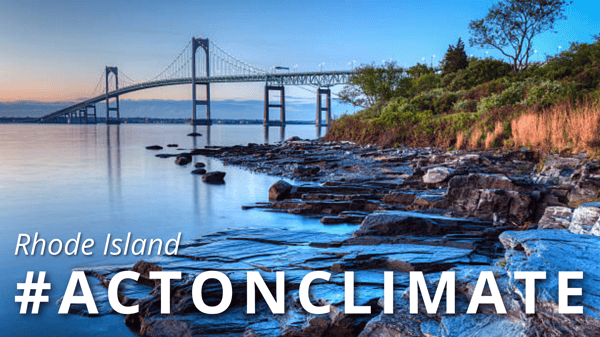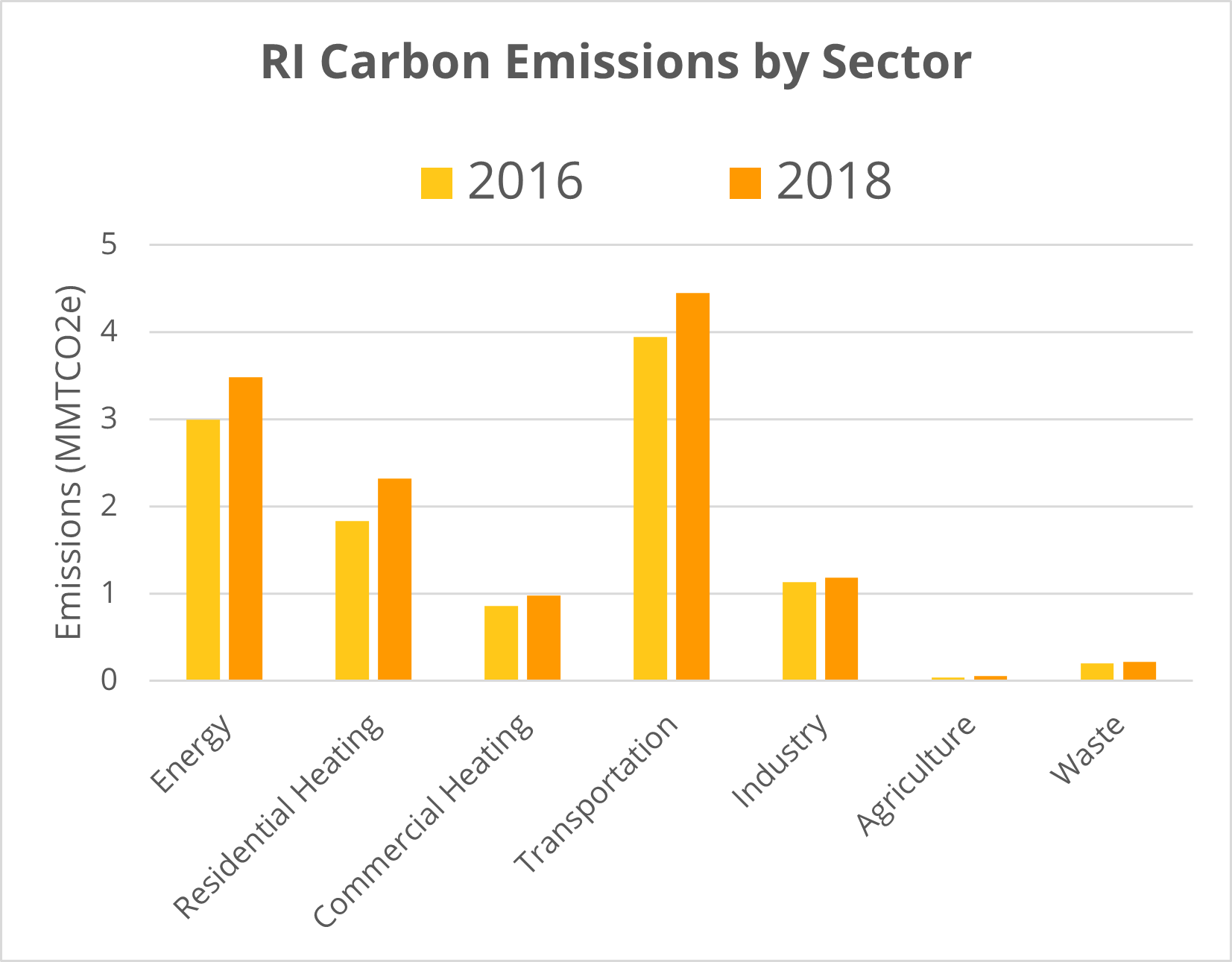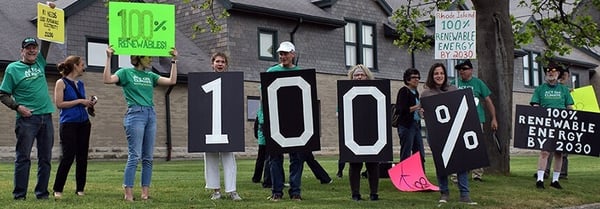UPDATE on June 8th: S2274 (100% Renewable) passed the Senate; all eyes are now on the House bill, H7277. The bill was amended to reach 100% by 2033, which would still make RI the first state to reach 100% renewable electricity. We need your help NOW to make sure this bill becomes law.
Contact your State Representative by Tuesday to ask them to vote yes on H7277.
S2583 (offshore wind procurement) also passed the Senate! Encourage your State Rep to support H7971 when you make your call. Thank you to the leaders who have worked to pass these bills.
Originally published May 5th, 2022
 Rhode Island is headed in the wrong direction when it comes to greenhouse gas emissions. A month ago, the state released worrying emissions data that shows the state’s GHG emissions in 2018 were up 15% from 2016, including increases in all sectors, with one of the biggest jumps in emissions coming from our electricity sector. This new data puts into question whether the state will be able to meet its 2020 climate goal, set in the 2014 Resilient RI Act. And it underscores the challenge before Rhode Island in meeting the 2021 Act on Climate mandate of 45% emissions reductions from the 1990 baseline in 2030.
Rhode Island is headed in the wrong direction when it comes to greenhouse gas emissions. A month ago, the state released worrying emissions data that shows the state’s GHG emissions in 2018 were up 15% from 2016, including increases in all sectors, with one of the biggest jumps in emissions coming from our electricity sector. This new data puts into question whether the state will be able to meet its 2020 climate goal, set in the 2014 Resilient RI Act. And it underscores the challenge before Rhode Island in meeting the 2021 Act on Climate mandate of 45% emissions reductions from the 1990 baseline in 2030.

RI emissions are up from 2016 to 2018 in every sector.
Rhode Islanders need policy action that we can trust will result in emissions reductions, not the commitments and pilot projects we’ve seen over the prior decade. This legislative session, the General Assembly must enact legislation to get Rhode Island to 100% renewable electricity by 2030 (S2274/H7277). The General Assembly should also pass equally important measures to transition to electric transportation and launch the offshore wind industry: the Electric Transportation Act (S2448/H7653) and the offshore wind procurement bill (S2583/H7971).
Together, these three bills are the cornerstones of reaching the 2030 Act on Climate goal; and they will set the state on track to meeting the required 80% emissions reductions by 2040 and net-zero by 2050.
Rhode Island can and should become the first state powered on 100% renewable electricity
Thanks to our small size, excellent efficiency programs, and copious offshore wind resources, Rhode Island is well-positioned to be the first state to reach 100% renewable electricity. The #1 thing we can do to reach that goal is to update the Renewable Energy Standard, which requires electric suppliers (the largest of which is the electric utility company) to include a rising minimum percentage of renewables in their electricity mix. S2274, sponsored by Senate President Dominick Ruggerio, and H7277, by Chair Deb Ruggiero, ups the yearly required renewable increase to reach 100% by 2030.
 The current Renewable Energy Standard (RES) has Rhode Island at about 20% renewable electricity, but we have a big surplus of renewables that we’re exporting out of state. Updating the RES will make sure “Renewable Energy Certificates” get retired here, thus giving Rhode Island credit in our emissions tracking for building and consuming renewable energy.
The current Renewable Energy Standard (RES) has Rhode Island at about 20% renewable electricity, but we have a big surplus of renewables that we’re exporting out of state. Updating the RES will make sure “Renewable Energy Certificates” get retired here, thus giving Rhode Island credit in our emissions tracking for building and consuming renewable energy.
Getting to 100% Renewable by 2030 is the right next step for Act on Climate. A 100% renewable grid will help us clean up the transportation and heating sectors as we start to move forward with electrifying vehicles and buildings. It’s an achievable goal because we have the solar and wind resources to meet it. This policy is also great for the economy and job creation; that’s why our labor partners at Climate Jobs RI are supporting the bill, as well as Governor Dan McKee.
For more on the topic of 100% renewable electricity, we have a new blog on that too.
Offshore wind will provide cheap green electricity to get us to 100%
Rhode Island’s strength in the marine trades and our location near the main offshore wind lease areas mean that our state is positioned to be a hub of the burgeoning offshore wind industry—but we have fallen behind in the race to develop new offshore wind projects. Since the Revolution Wind project was announced nearly four years ago, Rhode Island has made no major strides towards upping its commitment to offshore wind. Meanwhile, the Massachusetts Senate just passed legislation supporting the procurement of at least 10,000 MW by 2035—enough to power Rhode Island several times over.
 Rhode Island developed the first offshore wind farm off the coast of Block Island in 2016. Since then, we've let other states take the lead.
Rhode Island developed the first offshore wind farm off the coast of Block Island in 2016. Since then, we've let other states take the lead.
Rhode Island needs one more big offshore wind procurement as soon as possible to make sure we can reach 100% renewable electricity. We strongly support Governor McKee’s proposed legislation, S2583 and H7971, sponsored by Senate Environment Chair Dawn Euer and House Energy Oversight Chair Art Handy, which would do just that: requiring the utility company to go out to bid for up to 600 MW of offshore wind by the end of the year. A 600 MW procurement would get us most of the way to 100% by 2030; the rest could be filled in by strengthened solar programs, out-of-state renewables, or another wind procurement.
The legislation could be even better if it required at least 600 MW; encouraged partnering with municipal aggregations in the procurement process; and made sure the public had a chance to weigh in on draft RFPs before developers bid in.

Rhode Island has abundant offshore wind resources on the coast and plenty of companies ready to develop large-scale wind projects.
As our electricity mix gets cleaner, electric vehicles become a stronger tool to reduce emissions– if we can get them on the road.
In the last few years, electric car sales have skyrocketed in states across the country, but Rhode Island is lagging. In fact, Rhode Island has the lowest rate of EV adoption out of all six New England states. We’ve been slow to establish incentives to make the upfront cost of a new EV more affordable, slow to expand the charging network to apartments, condos, workplaces, and businesses, and slow to direct the utility company to establish smarter rates for EV charging. Rhode Island has also failed to invest in alternatives to car ownership by snubbing investments in our transit and walking/biking paths. All of this means that in the last year, we’ve sunk further into gasoline dependence, which has been bad for our economy, climate, public health, and the budgets of working families.
 For Rhode Island to meet the Act On Climate mandate, we need to eliminate gasoline dependency by electrifying all vehicles and enabling alternative modes of travel. The state has made minimal progress in both areas.
For Rhode Island to meet the Act On Climate mandate, we need to eliminate gasoline dependency by electrifying all vehicles and enabling alternative modes of travel. The state has made minimal progress in both areas.
What does Rhode Island need to do to stop putting new dirty cars on the road? H7653 sponsored by Rep Cortvriend and S2448 sponsored by Senator DiMario set a goal and planning process in motion to make it possible for 100% of new car buyers in Rhode Island to choose an EV by 2030. The bill ties Rhode Island’s clean vehicle regulations to California so we can catch up to the country’s leader in EV sales, while boosting the growing EV market so that drivers who want to do the right thing for the climate (by buying an EV instead of a gas car) aren’t held back by cost or charging availability.
Make no mistake- EVs are coming, whether Rhode Island is ready or not. The question is whether our policies will be reactive – responding to issues as they pop up -- or proactive – to add EVs in a way that’s planned, measured, and helpful in meeting our climate goals.
Honorable Mention Policies
This legislative session saw more good climate bills than ever—it was hard to pick our favorites! Some honorable mentions include:

Building Performance Standards (H7850, Kislak) This bill requires large buildings in the state to report their emissions and energy use; it also sets a schedule for them to ratchet down emissions over time. This legislation sets a path forward for emissions reductions from the building sector, which is one of the hardest areas of decarbonization.
Mercury Lightbulb Phase Out (S2866/H7788, Ruggerio/Handy) continues last year’s work to update appliance efficiency standards by phasing out toxic fluorescent lightbulbs. Although these bulbs were at one point the efficient option, they have been fully replaced by LED bulbs. LEDs are cheaper, more efficient, and don’t contain mercury. Phasing out fluorescent lighting is good for consumers’ pocketbooks, the climate, and our health. [link to appliance standards blogs]
Environmental Justice Act (S2087/H8036, Euer/Alzate) defines environmental justice and designates certain areas in the state as Environmental Justice Areas. It protects these areas from future siting of polluting facilities that worsen historic environmental impacts.
Funding for climate priorities in the budget. The budget has some high points and some weak points, like the efficiency scoop. Check out our blog from earlier this year for more detail.
More solar on developed land (H7531, Speakman). This bill increases incentives for the Renewable Energy Growth program, a well-overseen program that has categories for rooftops and small-scale solar. It also adds new categories for solar on carports and schools, and it protects core forests from industrial-scale solar.
Bond referenda to fund the Transit Master Plan and Bicycle Mobility Plan (H8112/H8113, Tanzi). Electric vehicles are an important part of reducing emissions from transportation, but they can’t be the only strategy. Investing in better transit and biking paths will help reduce our dependence on cars, especially for short trips and for Rhode Islanders who struggle with the cost of car ownership.
Help us pass our top climate priorities
Thank you to the many legislative leaders who are working to pass these bills. There’s just over a month left in this legislative session. The single most influential thing you can do for the climat
- 100% renewable electricity (S2274/H7277)
- Electric Transportation Act (S2448/H7653)
- Offshore wind procurement (S2583/H7971)
If you’ve never called your legislators before, we know it can be a little intimidating. Here are some tips:
- You don’t have to be an expert on the bills. Focus on your personal concern about climate and how you want to see action in 2022.
- Be sure to name the bill numbers.
- Feel free to send them an email too!
Thank you for your continued support; it really does make a difference. If you want to continue to learn more about our advocacy work, please join us for our Spring Meeting on May 18 from 5-7PM! We’re celebrating our 40th year as an organization and would love to have you there in person. Learn more and RSVP at greenenergyconsumers.org/40years.

 Rhode Island is headed in the wrong direction when it comes to greenhouse gas emissions. A month ago, the state released
Rhode Island is headed in the wrong direction when it comes to greenhouse gas emissions. A month ago, the state released 
 The current Renewable Energy Standard (RES) has Rhode Island at about 20% renewable electricity, but we have a big surplus of renewables that we’re exporting out of state. Updating the RES will make sure “Renewable Energy Certificates” get retired here, thus giving Rhode Island credit in our emissions tracking for building and consuming renewable energy.
The current Renewable Energy Standard (RES) has Rhode Island at about 20% renewable electricity, but we have a big surplus of renewables that we’re exporting out of state. Updating the RES will make sure “Renewable Energy Certificates” get retired here, thus giving Rhode Island credit in our emissions tracking for building and consuming renewable energy. Rhode Island developed the first offshore wind farm off the coast of Block Island in 2016. Since then, we've let other states take the lead.
Rhode Island developed the first offshore wind farm off the coast of Block Island in 2016. Since then, we've let other states take the lead.
 For Rhode Island to meet the Act On Climate mandate, we need to eliminate gasoline dependency by electrifying all vehicles and enabling alternative modes of travel. The state has made minimal progress in both areas.
For Rhode Island to meet the Act On Climate mandate, we need to eliminate gasoline dependency by electrifying all vehicles and enabling alternative modes of travel. The state has made minimal progress in both areas. 

Comments